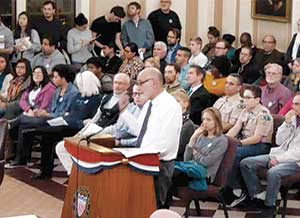
The Aldermanic Chambers saw a packed house last week as concerned parties gathered for a public hearing on Community Benefits Agreements.
By Joe Ruvido
At their meeting on Thursday, the Board of Aldermen held a public hearing on Community Benefits Agreements (CBAs) at the request of a petition to the Board.
An assortment of community groups, led by Union United and the Somerville Community Corporation, are asking the board to sign and implement a CBA before approving any zoning or permits for the Union Square Development and MBTA Green Line Extension into Somerville.
According to the city website, the Union Square Revitalization Plan is a high priority of Mayor Curtatone’s administration. The plan would create thousands of jobs and connect East Somerville to Downtown Boston and Cambridge via rail in addition to the five bus routes that currently service the area.
Backers of a CBA welcome the economic development but note that development and gentrification come at a cost to low-income families, the environment, and a vibrant arts and culture scene. They want to hold developers and the city to quotas of open space, affordable housing, and local labor hired for projects.
In a defining paper on CBAs called The Sleeping Giant: Community Benefit Agreements, Thomas Musil states that, “The development of CBAs has slowly occurred with the involvement of foundations, labor unions, and CBA advocacy groups. They are legally binding contracts between developers and CBA Coalitions and, once negotiated, developers then approach the issues of regulatory applications, reviews, and approvals.”
Proponents point the success of CBAs in the building of the new Yankee Stadium in New York and redevelopment of Oakland, California as evidence of their efficacy. Those cities kept to promises of hiring local labor and paying a prevailing wage as stipulated in the CBAs they signed.
The speakers were led by CBA consultant John Goldstein, who noted that the rate of low-income communities affected by inequitable development has more than doubled between 1990 and 2010.
Following Mr. Goldstein were an array of community activists, religious and political leaders, and concerned citizens. Ben Echevarria, Director of The Welcome Project of Somerville, emotionally recalled the importance of keeping communities together through development: “A CBA will allow citizens and residents to have a say, through a legally bound contract.”
Ed Halloran, President of the second biggest union in Somerville, The Somerville Municipal Employees’ Association, echoed that sentiment: “It’s about displacement, affordable housing, and a prevailing wage.”
Karen Narefsky, organizer with the Somerville Community Corporation and Union United summed up the organizations’ coalition to the Board: “The group has to include low income renters, homeowners and businesses, immigrants and people of color, who are often disenfranchised and most at risk of displacement,” referring to the parties in a CBA.
The Aldermen appeared receptive to the idea of a CBA. “I find the arguments here extremely compelling. The concept proves to have been successful in a number of other cities around the nation. We have an opportunity to take a clear step in making sure that the values that are critical to us here are enacted,” said Ward 6 Alderman Lance Davis.
The matter was referred to the Land Use Committee, which will next meet on November 16. The public record on this matter will be kept open for written comment until Monday, November 28.












I support commitments to open/green spaces, responsible development in terms of parking and transportation infrastructure, and assurances absolutely no permits for food or retails chains will be issued for Union Sq.
However, housing and labor costs should be determined by the market. Why should we pay extra in taxes to support sweet deal labor contracts? Why should property owners see the city intervene in the rental market to their detriment?